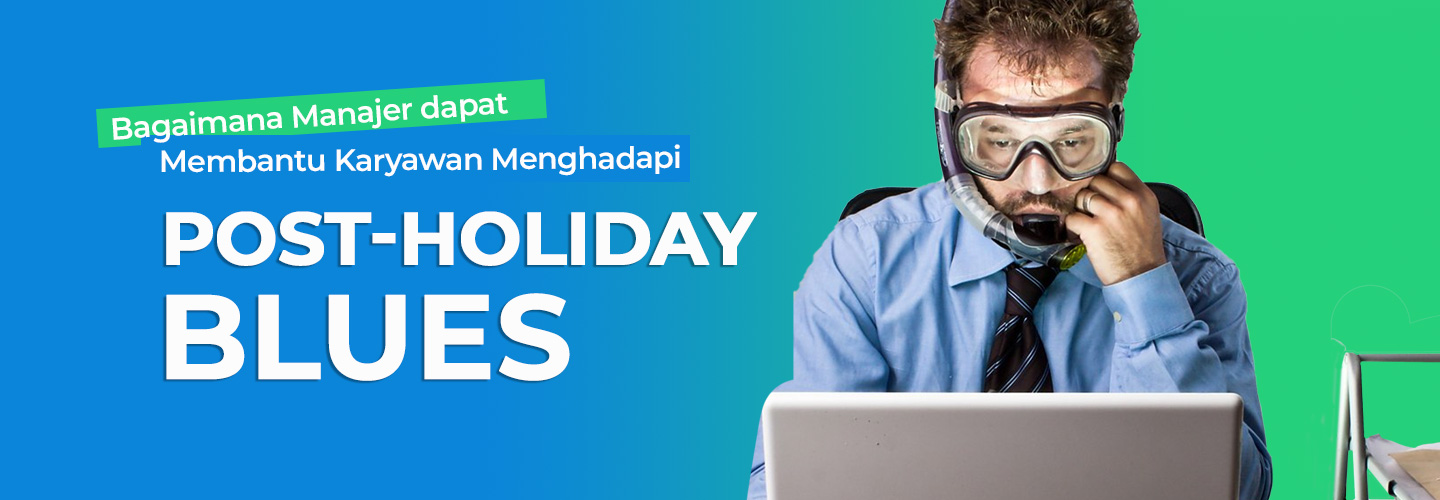How Managers Can Help Employees Cope With Post-Holiday Blues

Approaching the holiday celebration, office workers who plan to spend their holidays and leave to do various fun activities such as visiting tourist attractions or gathering with their families, After a long vacation, it's not uncommon for employees to feel less motivated before returning to the office. This condition is often called the post-holiday blues.
Post-holiday blues are negative feelings that arise in a person when he returns to work after a vacation. Some of the symptoms of Post-Holiday Blues include a bad mood, feelings of anxiety, and low motivation/energy when someone's vacation is over. These feelings generally last only a few days, and can pass more quickly if the employee has support and assistance.
Causes of Post-Holiday Blues
There are several factors that can drive the emergence of Post-Holiday Blues
Change of routine.
An employee generally has a daily routine that he does from morning to night, and this daily routine can change during holidays. For example, if he usually wakes up at 6:00 a.m. on weekdays, then, on vacation, he might get used to waking up at 8:00 a.m. When he has to go back to work and wakes up again at 6:00 a.m., he may have a hard time adjusting to his previous routine.
Below-expectation vacation.
Some holiday activities actually provide negative experiences, especially if the vacation does not meet expectations. For example, if a vacation makes someone physically or mentally too tired or makes him spend more than what has been budgeted for, then this can make him feel depressed.
Anxiety over the workload.
When the holidays are over, employees often think about or are expected to be able to immediately finish the work left before the holidays, such as unread e-mails or documents that need to be processed. This can trigger feelings of anxiety or pressure over the workload when they want to return to the workplace.
Stressful workplace conditions.
Holidays provide an opportunity for an employee to temporarily leave their job and workplace, as well as conditions that might make them stressful at work, such as conflicts with co-workers. If someone's workplace makes them depressed, then, he will also feel uncomfortable when he returns to the workplace.
How Managers Can Help Employees Cope With Post-Holiday Blues
Here are some ways managers can help employees deal with the Post-Holiday Blues
Identify employees who are more prone to Post-Holiday Blues.
Some personality types are more prone to experiencing Post-Holiday Blues than others. For example, those who tend to be organized and planned are generally more likely to become stressed if they have to make frequent changes to their routines or when vacations don't go as planned. In addition, those who tend to be ambitious or perfectionists may feel Post-Holiday Blues because they think of the effort they have to put in to catch up on their holidays. Identification of these personality tendencies can help a manager see what his team needs if he catches any demotivation after the holidays.
Make a plan of tasks and communicate expectations after the holidays.
Managers can plan priorities for tasks that need to be completed after vacation, as well as communicate their expectations to their subordinates in the first days of vacation. This can help employees understand what is expected of them, so they can also plan what tasks need to be done. Managers should also give employees the opportunity to discuss which jobs need priority when they return to the office.
Provide opportunities for employees to readjust to routine.
Managers can provide a number of flexibility for employees to be able to adjust to returning to the workplace, which of course is adjusted to the conditions and policies of the company. For example, managers can provide opportunities for employees to work from home so that employees can realign their working hours, remind employees to maintain physical and mental health, as well as create an agenda for relaxing activities that encourage enthusiasm and anticipation to be able to return to the workplace.
Understanding the characteristics of employees in the workplace will be very useful for managers to know what needs to be done to help employees deal with the Post-Holiday Blues. One way that can be done is through assessment. Psychological assessment can help map characteristics of the nature and personality of employees, how they deal with problems, and what things can drive their motivation, so that managers can more easily help employees return to work after a vacation period.
Article by Herjuno Tisnoaji - Resident Assessor of prasmul-eli